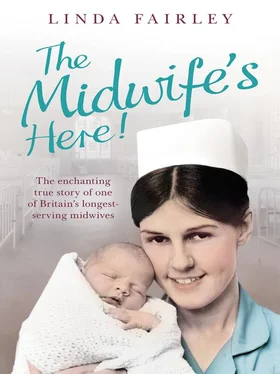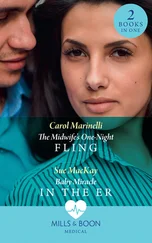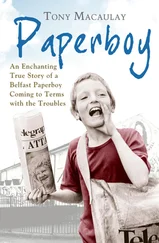1 ...6 7 8 10 11 12 ...16 Maggie caught my eye and winked, but I still felt slightly nervous. Mr Finch looked a bit scruffy, with nicotine-stained fingers and blackened teeth, and I shivered as I wondered what we might have to deal with under the sheets.
‘Any trouble from him, Nurse Lawton, and we’ll make sure the water is ice cold next time,’ Maggie said in an exaggerated whisper.
On the trolley Maggie had a pot of zinc and castor oil cream, a metal bowl filled with warm water and a tin of talcum powder. Mr Finch reached into his locker and produced a toilet bag containing a bar of Palmolive soap, two grey flannels and a small, thin towel.
Maggie showed me how to strip the counterpane back and pull the blanket off the patient and over an A-shaped frame she had placed at the foot of the bed.
‘Keep the top sheet in place and work underneath it as best you can,’ Maggie said quietly. ‘That’s the privacy guard.’
She demonstrated by washing and drying Mr Finch’s face first and moving on to his arms, chest and underarms without exposing an inch of flesh unnecessarily.
‘Ooh, that’s grand, Nurse,’ Mr Finch commented. ‘You’re right good at this!’
Next I helped turn Mr Finch on his side, so Maggie could wash down his back and I could dry it. He certainly was as light as a bird. He was skin and bone, in fact, and I realised he looked rather like the old man in the television comedy Steptoe and Son, which amused me.
‘Would you wash your private bits?’ Maggie said, making it sound as though she was posing a question when in actual fact she was instructing Mr Finch politely to do so.
‘Course,’ he said. ‘I tell ye what, it’s a damn sight easier t’ get m’self clean nowadays. Used to be murder when I were down the pit.’
It turned out that Mr Finch was born at the turn of the century and had worked nearly all his life at the Astley Green Colliery in Wigan, mining coal for decades until his retirement a few years earlier. He had seven children and seventeen grandchildren, and had served in both world wars.
As Maggie and I rolled him onto each side again so we could strip and re-make the bed beneath him, I thought how silly I was to have been nervous about him, and how unkind I was to have assumed he might be smelly or uncouth, just because he was old and had spent his life working his fingers to the bone.
I loved getting to know such interesting folk and I soon realised that once people are stripped bare in a hospital bed, that’s when you find out who they really are. This realisation struck me as so profound that I wrote it down in my notebook when I returned to my room after tea, because I never wanted to forget it. As I did so, I realised with some satisfaction that despite still being plagued by homesickness, and despite feeling mentally and physically drained at the end of the day, I was doing my very best and I was slowly starting to find my feet.
I fell into an extremely deep sleep that night. Sister Mary Francis would have called it the ‘sleep of the just’, but my much-needed slumber was suddenly interrupted when an alarm bell rang out. In my dream I saw a ghostly-white patient desperately pressing a red emergency buzzer. I couldn’t see the patient’s face and I didn’t know which ward he was on or what was wrong with him. I could see him holding out his hands to me, but I couldn’t get close enough to help him because I was stuck behind a pile of textbooks that towered higher and higher the more I tried to move forwards. Physiology. Anatomy. Dietetics. Bacteriology. The words swarmed, distorting my vision.
‘Wake up, Linda! Get up quick!’ It was Anne’s voice, and she was hammering on my door. ‘There’s a fire! Get up!’
I stumbled out of bed, my heart thumping. The alarm in my dream suddenly got louder and louder. My door was open now and I could see nurses running towards the emergency exit along the corridor. The fire alarm was blasting out as I grabbed my dressing gown and ran, barefoot, into the arms of a burly fireman.
‘Steady now!’ he grinned. ‘There’s no need to panic. Just make your way outside calmly and we should be able to get you back inside in no time at all.’
We were told a small fire had broken out on the opposite side of the nurses’ home, which was soon contained. This news travelled quickly around the car park, where I stood shivering in my nightie and dressing gown, still feeling drugged by sleep. Eventually another very handsome fireman led me back to my room, which he was in the process of checking over when the home sister stuck her nose round my door.
‘See that you remove that poster in the morning,’ she said huffily, pointing to my beloved black and white John Lennon portrait taped boldly above my bed. ‘You know quite well it is forbidden to decorate the walls.’
The fireman flashed me a dazzling smile and rolled his eyes behind her back before wishing me a very good night.
‘Do you know, I think I’ll always have a soft spot for firemen,’ I told Anne dreamily at breakfast the next morning.
‘All the more reason to work hard,’ Anne replied with a wink. ‘Everyone knows firemen have a soft spot for nurses, too.’
‘You’re right,’ I smiled. ‘Perhaps I’ve chosen the right career after all!’
Chapter Three
‘I didn’t expect to be looking after people who are actually ill’
‘Lawton, attend to Mrs Roache in bed thirteen,’ Sister Bridie ordered. I hated the way she addressed us by our surnames, as if we were in the Army. I leapt to attention, nevertheless.
I was now a good few months into my first year of training. So far I’d had a trouble-free start to my nursing career. Soon after the eight weeks of study with Mr Tate, which were punctuated by visits to wards and units, I completed my first placement, which happened to be at the eye hospital over the road in Nelson Street.
We had no say in where we were sent for work experience, but I had no complaints and was quite happy dishing out eye drops, wiping down lockers and fetching cups of tea for patients, while at the same time learning how to sterilise equipment, organise the linen cupboard and generally keep Sister happy.
The only part of the work that worried me at the eye hospital was using the sterilising equipment. The machine was different to the bedpan steriliser I’d become accustomed to operating in the sluices at the main hospital. This one stood on a substantial trolley that was positioned right in the middle of the ward. It looked harmless enough, shaped like a small stainless-steel oven, but it hissed and bubbled as loudly as a witch’s cauldron.
I’d seen other nurses adeptly sterilising kidney bowls, syringes and needles, seemingly oblivious to the dangers of the swirling clouds of hot steam the contraption emitted whenever it was opened, but I was scared to death the first time I had to operate it by myself, jumping back in fright as the sweltering steam billowed into my face. I practically threw the instruments in, pulling my hand away and slamming the door shut in record time. It was a miracle I hadn’t been burned, especially as I had to repeat the process in reverse five minutes later, retrieving my poker-hot equipment with a pair of Cheatle forceps.
Needless to say, I soon got used to the steriliser, and by the time I left the eye unit I think I could have operated it in my sleep. My next placement was to be on Sister Bridie’s surgical ward.
‘Are you looking forward to it?’ Graham asked me the night before I was to start there, when he picked me up in his car and took me out for a coffee at a little snack bar in Piccadilly Gardens, up near the station.
‘Oh yes,’ I replied. ‘Very much so. The eye unit was good experience but it wasn’t exactly exciting.’ The fierce steriliser had been the only thing that made my pulse quicken. ‘I’m ready for the next challenge. A surgical ward should be very interesting. It’s a female ward and I expect women need surgery for all sorts of reasons. It’ll be good to deal with more than just eyes.’
Читать дальше












